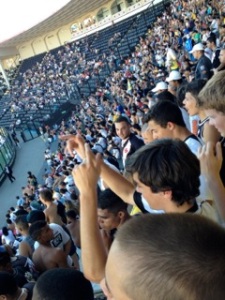There was a trail of pink juices slipping down her chin when I noticed my mouth was watering. Ali’s teeth tore violently at the bloody meat. The steam was still floating above the filet as she promptly devoured it. Her guilty, wicked smile could not go unnoticed as the music of forks and knives colliding around me clattered loudly in my head. Meanwhile, my stomach was creating a song of it’s own.
This was the pride of Rio de Janeiro. If there was one thing I remembered during pre-port, it was the recommendation of the steak. We were told the dinner would cost $50 per person, but that every dollar was worth it. Porcao was the place, and tonight, every student, every faculty member, and every child was there. It was the busiest night in the restaurant’s history, and I was surprised we got the table for 14 that we did. For $50, each person would get endless meat and as many trips to the buffet as needed—except for me.
Honestly, I can’t afford shit. The reason I’m on this ship is because of financial aid and student loans. With the government paying for my fees and my parents paying for all personal expenses out of their own pocket, I have learned to spend my money minimally. And yes…if that meant skipping an endless serving of steak, I had to do it. At least, my morals told me I had to.
I think the main problem was that I had nowhere to look. There I was, seated two from the left end, and four from the right. Our table of 14 stretched along the glass wall separating us from the buffet station. Above us hung a chandelier tower of Brahma beer bottles. The arms on each side of me were either in the process of nibbling at the remaining meat on their forks or tearing at the skewers the waiters circled our table with every 40 seconds.
“Why aren’t you eating?” It was Dean John’s turn to walk by my table and greet us. This was the fourth faculty member to visit us in fact, and the fourth time I had to admit as to why I was, alone, not able to taste what everyone had made reservations for. I shamefully tightened my lips and glanced down at my plate.
“Can’t afford it.” I wondered how closely the color of my face resembled the rare, pink tint of the steak that was being carried by the waiter to my right.
I imagine John told me something polite and clever, however, I can’t quite recall because my focus was again called to something else. The waiter stood in front of me now. His smooth black vest and ruby red bow tie fooled me for a second that he was my own personal butler, delivering me dinner. He held a skewer that held enough meat to resemble a man’s calf. The knife fell through it with such fluidity as if it was chocolate pudding. As a feathery slice separated itself from the whole of the meat, I watched as he leaned toward me with the slice. I imagine my mouth was in the shape of a zero as the steam floated beneath my nostrils. He feels bad. He’s going to give me some. Bless his soul!
I clutched at my fork blindly as my eyes locked onto the dripping oval of meat approaching me. My arm lifted to accept it as his skewer swerved just barely to the left, aiming onto the center of Ali’s plate. I could still feel the steam making my face sweat as it dropped beside me. My face burned with embarrassment as my right hand sloppily faked it’s way into a twirling motion, treating the fork like a baton. It might’ve been a weak way to hide my strike for the meat, but it seemed to work and the waiter promptly turned to carry the skewer to a new table.
“Fuuuuuuuuuuccccccckkkkkkkk.” It slurred out of my mouth slowly as I dug my head into the crevice between my left elbow and my armpit. Were my friends trying to smack their tongues as the meat swayed between their teeth? The aroma gave me goosebumps as the orgasmic moans of university students around me spilled from their mouths.
“Mmmmmmmmmmm.”
“Oh my god!”
Heavy breathing began drowning me as I peeked my right eye out to witness my friends holding their plates up to their faces, eyes closed, letting the smell of their fresh meat overwhelm their senses.
I cursed myself as I tugged on the roots of my hair. I swiped for the menu beside me and flipped to the dessert page with urgency. What’s cheap? What’s good, but what’s cheap? My finger trailed down the line before it landed on the chocolate mousse cake that was labeled as sixteen reals. Eight American dollars. I can do that.
I flung my hand into the air eagerly, catching the waiter’s attention immediately. I pointed aggressively at the words beside the price I desired, and with a subtle nod, he was gone. Again, I was alone, facing the lit up face of my other friend, Alex. Her hand rested on her belly as she leaned back, sighing. Her other hand still held her fork, slowly piercing the chicken heart that now lined her plate. I could tell she didn’t want anymore. She was full. She couldn’t eat any more food. Should I have felt guilty for finding pleasure in this? Maybe so. I waited to see if any of my friends would run to the bathroom to throw up the meat they had eaten too fast. I waited, watching their speed drag as their eyes drooped and their stomachs bloated.
One of their faces hit the table with a thud as a brand-new plate was presented before me. A brown, circular cake sat before me. A familiar grey steam floated above it, however, the smell was much different from the meat I had witnessed all night. I smelled Christmas Eve, when my mother and I would bake chocolate cupcakes while singing along to “Sleigh Ride” on the holiday radio station. Warmth traveled down my fingers as my fork made it’s way the center of this cake—my cake. The four prongs sank into the crusty skin before the chocolaty lava cascaded out onto the surface of the white plate. A gust of grey smoke erupted from the cake as the boiling lava escaped from its chocolate cave. I felt my chin resting upon the red table cloth as I watched this mud-slide of a meal tease me. Except this time, it wouldn’t escape me.
“That looks so good! Shit, why didn’t I save room for that?” Alex’s mouth fell as her eyes burned at my dessert. The jealousy was obvious, but tonight, right now, I felt no empathy. I smiled like a six year old brat who won a spelling bee. My grin twisted as my canine teeth made an appearance. My fork lifted the crusty shell of the chocolate toward my mouth before answering, “Guess you should’ve saved room,” before, for the first time tonight, my taste buds found what they were looking for.
—Melinda La Brie


